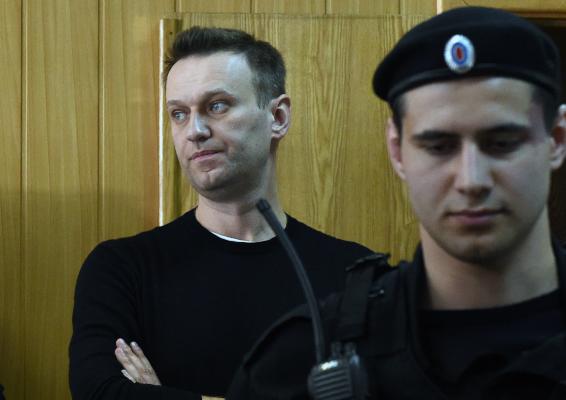Moscow – Prominent Kremlin critic Alexei Navalny was sentenced to 15 days in prison on Monday for his role in weekend anti-government protests in the Russian capital Moscow and other regions.
The development has buoyed the liberal opposition’s morale a year before a presidential election.
Sunday’s protest and others like it across Russia were estimated to be the largest since 2012 and foreshadow a presidential election which Vladimir Putin is expected to contest.
Opinion polls suggest Navalny, who hopes to run against Putin, has little chance of unseating the Russian leader, who enjoys high ratings. But Navalny and his supporters hope to channel public discontent over corruption to get more support.
Navalny, who will appeal the court’s verdict, was found guilty of disobeying a police officer at Sunday’s Moscow protest and sentenced to 15 days in jail. He was also fined for organizing the protest, which the authorities said was illegal.
“Even the slightest illusion of fair justice is absent here,” Navalny told reporters Monday from the defendant’s bench, complaining about the judge striking down one motion after another. “Yesterday’s events have shown that quite a large number of voters in Russia support the program of a candidate who stands for fighting corruption. These people demand political representation — and I strive to be their political representative.”
“You can’t detain tens of thousands of people,” he said. “Yesterday we saw the authorities can only go so far.”
Journalists and well-wishers packed the courtroom in central Moscow, where Navalny, in a selfie posted on Twitter, declared: “A time will come when we’ll put them (the authorities) on trial too — and that time it will be fair.”
Police detained more than 1,000 protesters across Russia as crowds took to the streets, at Navalny’s urging, to demonstrate against corruption and demand the resignation of Prime Minister Dmitry Medvedev.
Medvedev’s spokeswoman has dismissed corruption allegations against him as “propagandistic attacks”.
The Kremlin dismissed the protests as an illegal provocation and rejected US and European Union calls to free detainees like Navalny.
A spokeswoman for the EU said that Russian police prevented hundreds of protesters from practicing their political freedoms, including the freedom of expression that is protected by the Russian constitution.
It urged Moscow to respect its commitments to the international community in full and immediately release the detainees.
“We can’t agree with these calls,” Kremlin spokesman Dmitry Peskov told reporters on a conference call, saying the police had been professional and properly enforced Russian law.
He said the Kremlin had no problem with people expressing their opinions at protest meetings, but the timing and location had to be agreed with authorities in advance, something he said had not been done in large part on Sunday.
“We can’t respect people who deliberately misled minors – in essence children – calling on them to take part in illegal actions in unsanctioned places and offering them certain rewards to do so, thus putting their lives at risk,” said Peskov.
The wave of nationwide demonstrations that shook Russia’s long dormant political scene over the weekend showed a new face of protest: mostly teenage demonstrators driven by accusations of high-level official corruption, glaring amid the nation’s painful two-year recession.
The 40-year-old Navalny, Russia’s most popular opposition leader, has had three convictions on fraud and embezzlement charges that he dismisses as politically motivated. Even though the convictions technically disqualify him, he has announced a presidential bid for 2018.
With his colorful and sarcastic expose of Medvedev’s alleged collection of mansions, villas and vineyards — which garnered over 13 million views on YouTube — Navalny managed to draw tens of thousands to the streets across Russia in the biggest show of defiance since a 2011-2012 wave of protests rattled the Kremlin and led to harsh new laws aimed at suppressing dissent.
